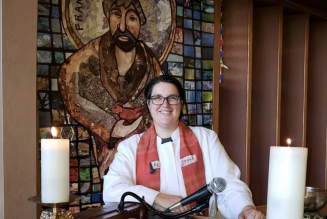
While men can still articulate a “good man” versus a “real man,” no categories remain for a “good woman” versus a “real woman.” Most of us operate unwittingly with the Marxist categories force-fed to us by feminism, particularly Betty Friedan’s propaganda about the toxicity of home and the freedom to be obtained through work. These little-scrutinized ideas about womanhood now provide the ideal for us today. Utility, productivity, power, and control have supplanted the virtues of what we used to equate with a good woman, such as kindness, compassion, and fidelity.
How, then, do we detox from this cultural and anthropological poison?
A feminist detox is particularly challenging because most women are not even aware of the brackish water in which we swim. The result is an inchoate idea about how healthy womanhood and humanity ought to look. Feminism has defined its own position and has also defined its opposition, the non-feminist, so effectively that flashes of women in red bonnets and robes in fertility cults, Stepford Wives, and doormats are all that come to mind. We’ve been fed an unhealthy binary cultural model.
Our daily life and personal relationships, however, can often offer a glimpse of women who don’t fit either extreme; women who are a lot more interesting, engaging, healthy, compelling, and even good. These are the kind of women we ought to aspire to be. But getting there takes some effort. Here are six ways to start:
1. Let Go of Guilt
Feminists frequently remind us that we should feel guilty for not being grateful for all that feminism has done for us. Like Mommy-dearest, feminism nags us into conformity with a reminder that we owe it a debt of gratitude for our careers and education. This tactic keeps most of us feeling guilty instead of looking behind the curtain. Maybe we didn’t need to destroy the whole culture for professional opportunities to have improved? Maybe men and children didn’t need to be thrown under the bus for such advantages to materialize?
Allowing ourselves not to feel guilty about feminism frees us to look at the positives and the negatives of the movement, instead of letting the negative aspects hide in plain sight. We certainly don’t treat other areas of life like this, such as the government or media, so why should we do it for feminism?
2. Stop Hoping to Reform Feminism
One objection I hear frequently about feminism, particularly among Christians, is that we should use it as a place to build bridges. The expectation is that if Christians can claim to be feminists themselves, then they have common ground among secular women to extend what they hope would be the olive branch of faith. This assumption, however, is based on the notion that feminism is elastic and can mean whatever we want it to mean.
Sadly, the regnant threads of feminism, for centuries, have clearly embraced three defining characteristics: smashing the patriarchy (or radical egalitarianism), free love (or the end of sexual monogamy), and the occult as detailed in my book The Anti-Mary Exposed: Rescuing the Culture from Toxic Femininity). No bridge can be built when these three elements are fundamentally opposed to the Christian faith and truths of human flourishing.
3. Figure Out What a Woman Is
Matt Walsh has made “What is a woman?” a popular question, but there are still few who can answer it with anything more than “an adult female human.” Here again, women need richer concepts when thinking about what women are. Feminism generally started with the question, “How do we make women more like men?” instead of “How do we help women as women?” Our understanding of womanhood has been erased because it prioritized the masculine over the feminine.
The most obvious answer that puts flesh on the definition of a woman is motherhood. Women are mothers — not just biologically, but also psychologically and spiritually. Women mother others. We see this in the richness of our relationships with family, friends, and colleagues. A mother creates a shelter where other people can be nurtured, loved, and protected to reach their full potential.
4. Stop Fighting Men
Most of us have been taught since early childhood that we can do anything as well as men, if not better. This programmed voice takes a lot of work to turn off because of the frequency with which it is repeated. Men are not meant to be our enemy. Yes, certainly, there are bad men out there, just as there are bad women. Vilifying all men while elevating (and believing) all women hasn’t given women any kind of a moral high ground. It has only fueled the worst kinds of envy and distrust, while heightening the war between the sexes to a new pitch.
5. Don’t Be Afraid of the ‘H’ Word
The last decade has seen a surge in what could be called the home arts: baking, cooking, knitting, interior design, and gardening. Despite their popularity, homemaking is still a taboo word, one that frequently evokes condescension. Here too is a vestige of Friedan’s success in calling the home a “comfortable concentration camp.” This knee-jerk reaction to home needs scrutiny to help clear out feminist programming.
The home isn’t meant to just be a hotel but is the place where a family learns how to love and be loved, and where children learn who they are. The home is the foundation, the place of solace, growth, comfort, safety, and authentic charity. Women play an integral role in all of that in the manifold seasons of life. Like the other seasons, being home offers its own gifts that can form and define a woman’s character.
6. Put God Over Self
Feminism feeds on narcissism and the myth that a woman can be an island. It has preached a vision of self-reliance and self-creation that erases the guidance, love, providence, and rules of God. The eradication of the Ten Commandments and the rewriting of Genesis 3, the temptation and fall of Adam and Eve, into a story where Eve acquires special knowledge from the serpent, was written early into the feminist script.
The erasure of these guiding principles has given way to the idea that women can live in any way we wish and still flourish as human beings. But human nature isn’t nearly as flexible as feminists might like, which is why female happiness metrics show clearly that women today are deeply unhappy — more unhappy than during the arrival of the second wave of feminism in the ’60s.
Flourishing, fulfillment, and a fruitful life have clearly been laid out for us through the Judeo-Christian tradition. We have a roadmap. And we have a direct means of reaching God, to hear His voice while He hears ours, and to live His love. Here is where our identity should be found, not in the fleeting and ephemeral values feminism has to offer.






